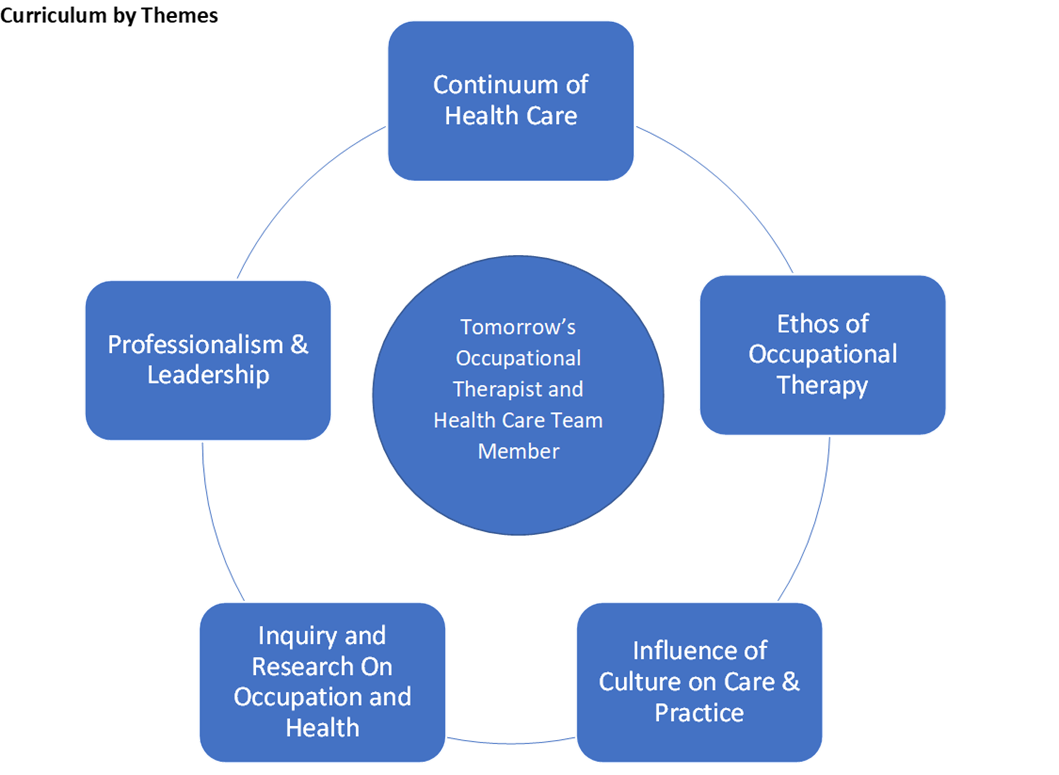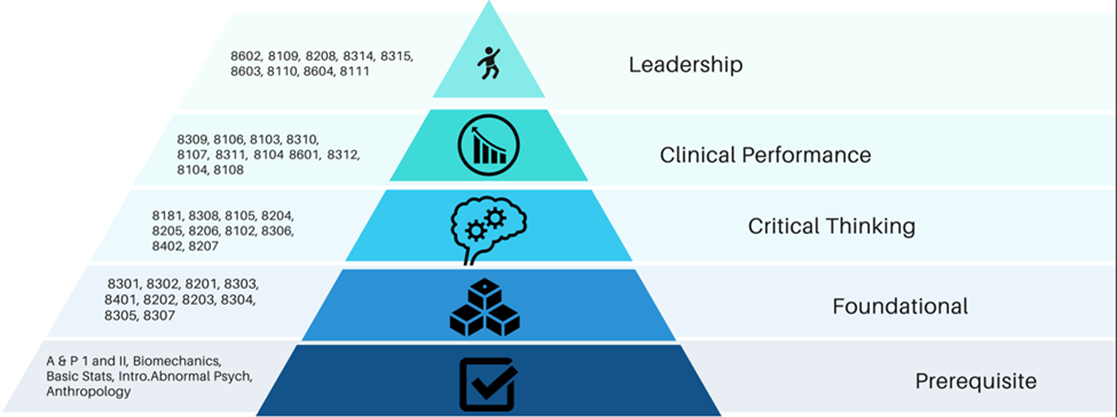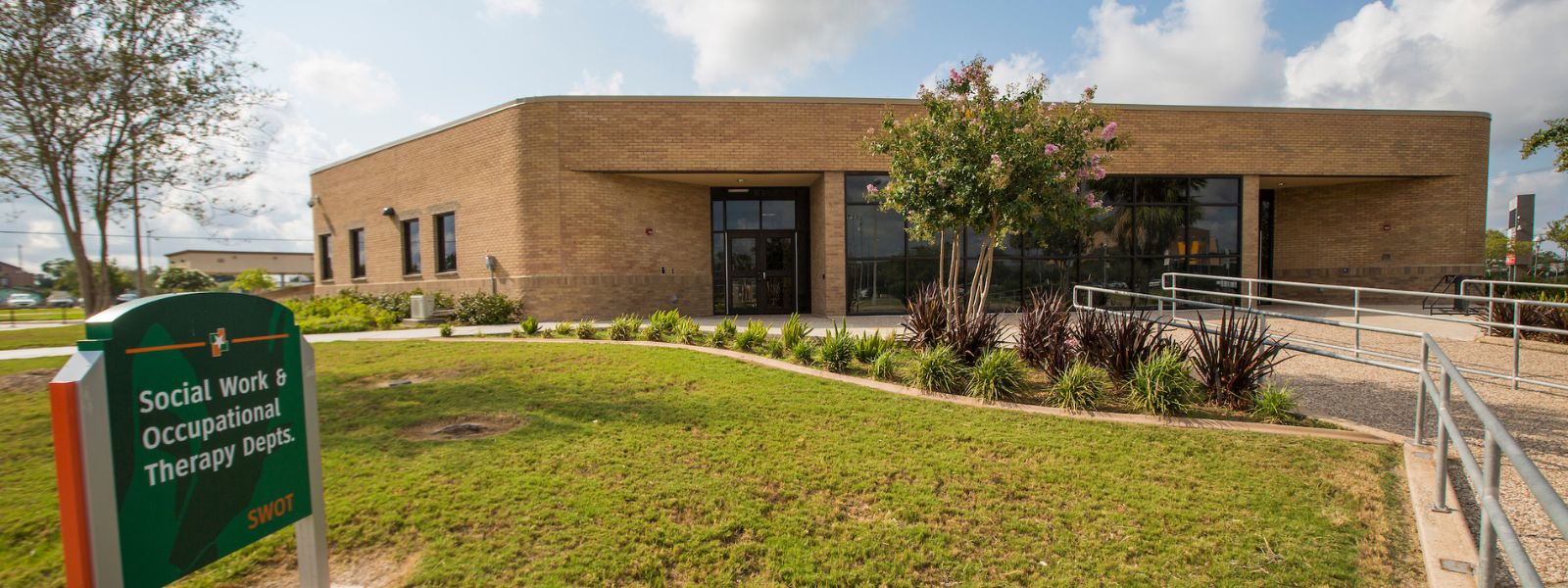The total time for the OTD degree is a minimum of 7.5 FTE academic years (4 years baccalaureate degree + 3.5 entry-level OT program). This OTD program is designed for students who hold a baccalaureate (undergraduate) degree.
- The 99 semester credit hours are offered over 3 terms – fall, spring, & summer – for a total of 40 months including 6 months of full-time clinical fieldwork, and a Doctoral Capstone.
- Program Philosophy: Occupational therapy education is grounded in the belief that humans are complex beings and that, through active engagement with the internal and external environments, individuals evolve, change, and adapt. The UTRGV Department of Occupational Therapy’s philosophy is guided by four major areas. These are:
- Provision of evidence-based therapy through occupation and translational research,
- Continuum of health care across the lifespan,
- Influence of culture on occupation and effective approach to health equity,
- Professional Reasoning and occupational adaption, and
- Interprofessional engagement.
Program Philosophy of Teaching and Learning:
The UTRGV Occupational Therapy education is a dynamic process using the art and science of occupational therapy. Students and faculty share responsibility for the learning-based interaction that fosters a commitment to lifelong learning—manifesting three operational methods within the curriculum.
- Learning by doing (modeling, case-based analysis, laboratory experiences, role-playing and simulation, and clinical education through Level 1, 2, and Doctoral Level Fieldwork experiences)
- Learning by discussion (based upon the work of Fawcett Hill and others (Learning through Discussion 1994; 2000) employing discussion based-upon inquiry, peer-to-peer interactions, instructor-focused Socratic method of Q and A, and open-ended wonderment on the part of students actively engaged in learning)
- Learning by clinical reasoning, feedback, and reflection (based on the work of Mattingly and Fleming (1994), Schon (1984), and the Carnegie Foundation for the Advancement of Teaching (2011), employing directed and focused self-reflection of learning and doing in action within classroom settings, focused self-reflection of learning and doing in action via online discussion boards, and by concentrated feedback and direction from instructors at the end of each semester and feedback from clinical instructors during on-site fieldwork
- experiences, students will transform to effective communicators and leaders, reflective learners with a learning-based approach, scientific and intellectual inquirers of information related to occupation and health, and seekers of community engagement and experiential learning opportunities. This is facilitated by faculty who are master clinicians and who are significant contributors to the professional, clinical, and academic communities.
The overall curriculum is organized around five focus/themes:
- Continuum of health care (public health/community-based)
- Inquiry and research on occupation and health (research)
- The ethos of occupation (administration, education, theory development) & human conditions (clinical skills & treatment)
- Influence of culture on care and practice (culture)
- Professionalism, Interprofessionalism, & Leadership (advocacy & services)

The instructional plan for the curriculum is built on five levels of knowledge and skills: prerequisite, foundation, critical thinking and reasoning, clinical performance & leadership. We have also included a pre-matriculation level to ensure the readiness of each student to engage in graduate education.
- Prerequisite: The essential background to build on is laid. Students entering the program must possess the building blocks not only for learning but also the technical knowledge to succeed.
- Foundation: The focus is on the acquisition and retention of information. This provides students with the groundwork of occupation, research, bodily function, and disability perspective.
- Critical thinking/reasoning: Within this level, the student develops the process of actively and skillfully conceptualizing, applying, analyzing, synthesizing, and evaluating information gathered from, or generated by, observation, experience, reflection, reasoning, or communication, as a guide to belief and action.
- Clinical Performance: This level allows the student to translate theory and approaches into practice and observe and define occupational therapy's roles in various clinical settings. The students acquire the knowledge, judgment, and skills for clinical decision-making.
- Leadership: This level prepares the student to understand what organizations are currently set up to deliver and what clients need and want. The student will learn to be agile and willing to innovate care delivery methods.

References
- Dewey, J. (2008: 1916). Democracy and Education: An introduction to the philosophy of education. Radford, VA: Wilder Publications
- Hutching, P., Huber, M.A., Ciccone, A. (2011). The scholarship of teaching and learning reconsidered: Institutional integration and impact. Stanford, CA: The Carnegie Foundation for the Advancement of Teaching.
- Mattingly, C., Fleming, M.H. (1994). Clinical reasoning: Forms of inquiry in therapeutic practice. New York: FA Davis.
- Rabow, J., Charness, M.A., Kipperman, J., & Radcliffe-Vasile, S. (1994; 2000) William Fawcett Hill's Learning through discussion. (3rd Ed). Long Grove, ILL: Waveland Press.
- Schon, D. (1984). The reflective practitioner: How professionals think in action. New York: Basic Books
Graduates of the program will:
- Be a reflective, visionary, and professional agent of change.
- Be ethical, culturally fluent, and effective.
- Practice in-depth clinical and specialized skills as well as research proficiency skills.
- Use clinical and research reasoning for evidence-based practice.
- Interact and communicate effectively with other professions and the community.

